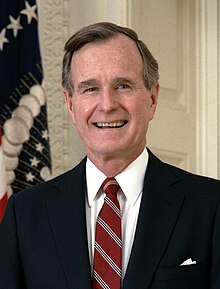📖 Presidential Profile
Comprehensive overview of leadership, policies, and historical significance
📋 Biography & Political Journey
Early Life and Military Service
George Herbert Walker Bush was born on June 12, 1924, in Milton, Massachusetts, to a wealthy banking family. At age 18, he enlisted in the U.S. Navy during World War II, becoming the youngest naval aviator at the time. He flew 58 combat missions in the Pacific Theater and was shot down by Japanese anti-aircraft fire over the Pacific in 1944, earning the Distinguished Flying Cross. After the war, he graduated from Yale University in 1948 and moved to Texas to work in the oil industry.
Political Career and Vice Presidency
Bush entered politics in the 1960s, serving in the House of Representatives from Texas and later as U.S. Ambassador to the United Nations under Nixon. He served as director of the CIA from 1976 to 1977 and was selected as Ronald Reagan’s running mate in 1980. As Vice President for eight years, Bush was deeply involved in foreign policy decisions and became Reagan’s closest advisor. His loyalty to Reagan helped him secure the Republican nomination for president in 1988.
Presidential Achievements and Foreign Policy
Bush’s presidency was dominated by foreign policy successes, including overseeing the peaceful end of the Cold War and the fall of the Berlin Wall in 1989. He skillfully managed U.S.-Soviet relations during the collapse of the Soviet Union, maintaining stability during a period of dramatic change. Bush also led a successful international coalition in the Gulf War, liberating Kuwait from Iraqi occupation in 1991 with minimal American casualties. He signed the Americans with Disabilities Act and several important environmental protection measures.
Economic Challenges and Broken Promises
Despite his foreign policy successes, Bush faced significant domestic challenges, particularly a recession that began in 1990. His most controversial decision was breaking his famous campaign promise of “Read my lips: no new taxes,” when he agreed to raise taxes as part of a budget deal with Congress in 1990. This decision alienated conservative Republicans and contributed to his defeat in 1992. His perceived disconnect from economic struggles facing ordinary Americans became a major campaign issue.
Broccoli and Lighter Moments
Bush became famous for his hatred of broccoli, declaring “I do not like broccoli. And I haven’t liked it since I was a little kid and my mother made me eat it. And I’m President of the United States and I’m not going to eat any more broccoli.” He was known for his tendency to mangle words and create new terms, such as calling grandchildren “the little brown ones” (referring to his Hispanic grandchildren) in an attempt at affection that came across awkwardly. His energetic personality led to moments like vomiting on the Japanese Prime Minister during a state dinner in 1992, which became an unfortunate international incident.
Humor & Jokes
Bush 41 vs Bush 43
Why is George H.W. Bush called 'Bush 41'? Because even in numbering systems, he wanted…
Read More →Greatest Wins
🕊️ Peaceful End to the Cold War
Bush skillfully managed the collapse of the Soviet Union and end of the Cold War…
Read More →Epic Fails
🌪️ Hurricane Andrew Response and Federal Emergency Management Failures
Bush's delayed and inadequate federal response to Hurricane Andrew devastated his approval ratings and exposed…
Read More →